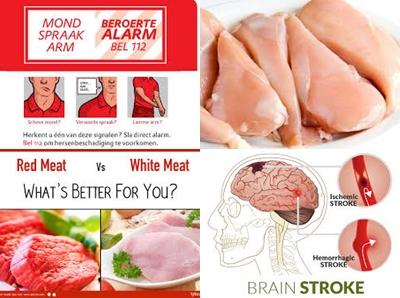
Objectives:
Previous meta‐analyses on meat intake and risk of stroke did not report the effect of white meat (poultry meat, excluding fish) and did not examine stroke incidence and mortality separately. Therefore, this review article (meta-analysis) has been conducted.
What is the relationship of total (red and processed meat), red (unprocessed or fresh red meat) and processed (processed red meat) meat consumption along with white meat on risk of stroke incidence and mortality disease risk?
Study design:
This review article included 15 prospective cohort studies (254,742 participants with 9,522 stroke incidents and 487,150 participants with 12,999 cases of stroke mortality). The follow-up duration varied from 5.5 to 26 years.
There was no significant publication bias based on the Egger test except that the evaluation of total meat with stroke incidence reached the significance threshold.
The average score for study quality assessed by the Newcastle‐Ottawa Scale was 7.29 (range 7-8) for studies on meat consumption and stroke incidence and 6.87 (range 6-8) for those on stroke mortality.
Results and conclusions:
The investigators found that a high total meat (red and processed meat) consumption resulted in a significantly higher risk of 18% [pooled relative risk = 1.18, 95% CI = 1.09-1.28, I2 = 0%] for total stroke incidence. Significantly means that there is an association with a 95% confidence.
The investigators found that a high red meat consumption resulted in a significantly higher risk of 11% [pooled relative risk = 1.11, 95% CI = 1.03-1.20, I2 = 0%] for total stroke incidence.
The investigators found that a high processed meat consumption resulted in a significantly higher risk of 17% [pooled relative risk = 1.17, 95% CI = 1.08-1.25, I2 = 0%] for total stroke incidence.
The investigators found that a high white meat consumption resulted in a significantly lower risk of 13% [pooled relative risk = 0.87, 95% CI = 0.78-0.97, I2 = 0%] for total stroke incidence.
The investigators found, however, no significant associations between consumption of total [RR = 0.97, 95% CI = 0.85-1.11, I2 = 0%] or red meat [RR = 0.87, 95% CI = 0.64-1.18, I2 = 70.9%] and stroke mortality. No significant associations because RR of 1 was found in the 95% CI of 0.64 to 1.18. RR of 1 means no risk/association.
The investigators found that a high total meat consumption was associated with an increased risk of 41% for hemorrhagic stroke [RR = 1.41, 95% CI = 1.08-1.84, I2 = 0%], but no significant association was found between a high total meat consumption and ischemic stroke [RR = 1.16, 95% CI = 0.94-1.43, I2 = 40.6%].
The investigators found a positive association between total meat consumption and stroke incidence, regardless of sex, number of cases and follow‐up duration.
The investigators found when stratified by adjustment variables, studies that adjusted for family history of myocardial infarction, fruit and vegetable intake and use of aspirin showed a statistically significant relationship between total meat intake and risk of stroke compared with other studies that did not include those as adjustment variables.
The investigators found that a high red meat consumption was associated with an increased risk of 24% for ischemic stroke [RR = 1.24, 95% CI = 1.05-1.46, I2 = 17.7%], but no significant association was found between a high red meat consumption and hemorrhagic stroke [RR = 1.11, 95% CI = 0.89-1.38, I2 = 0%].
The investigators found that a high processed meat consumption was linked to neither ischemic [RR = 1.10, 95% CI = 0.96-1.27, I2 = 11.4%] nor hemorrhagic stroke [RR = 1.19, 95% CI = 0.95-1.49, I2 = 8.10%].
The investigators concluded that higher consumption of red or processed meat is associated with an increase in the risk of stroke, while higher intake of white meat is related to a reduction in stroke incidence. Therefore, recommendations for replacing proportions of red and processed meat to white meat for the prevention of stroke may be considered in clinical practice.
Original title:
Role of Total, Red, Processed, and White Meat Consumption in Stroke Incidence and Mortality: A Systematic Review and Meta-Analysis of Prospective Cohort Studies by Kim K, Hyeon J, […], Park SM.
Link:
https://www.ncbi.nlm.nih.gov/pmc/articles/PMC5634267/
Additional information of El Mondo:
Find more information/studies on meat consumption and cardiovascular diseases right here.